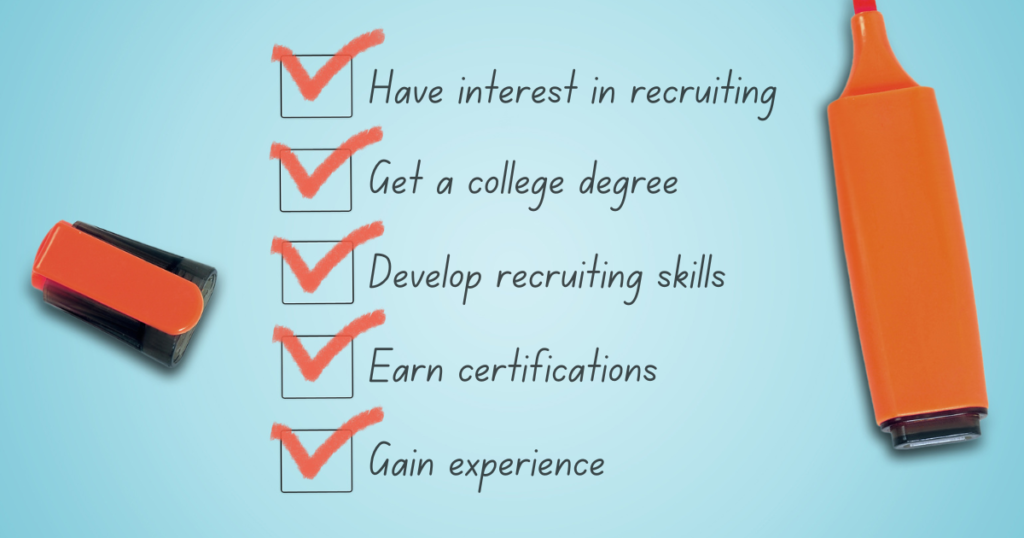Last Updated on September 20, 2024
If you are interested in becoming a recruiter then you are in the right place! Recruiting can seem like a bit of a foreign concept to some. Luckily, it’s not nearly as complicated or confusing as it might seem.
The following guide will walk through the basics of the very rewarding field of recruiting and explain a number of critical questions that you might have.
Quick Links
How to Become a Recruiter: Everything You Need to Know
To begin, here are the basics regarding recruiters and recruiting:
What is a recruiter?
A recruiter is a human resources (HR) professional whose job is to find candidates for job openings. Recruiters can work internally within an organization or perform their services externally as a staffing or recruiting agency. A great way to think about recruiters is as a “professional matchmaker”.
A recruiter’s job is to find excellent job candidates for job openings at their company or at a company they are working for. Their goal is to build an excellent team of employees. However, this does not always come easily. Some positions that recruiters hire for are in a small, specific niche with tough requirements. On the other hand, some roles are entry level with a low threshold of requirements making them easy to hire for.
What does a recruiter do?
Now that you know what a recruiter is and what their goals are you need to know what they do to achieve these goals. While the duties of a recruiter vary by the position and organization, these are some of the responsibilities that a recruiter could have:
- Talking with employers to understand their needs
- Writing job descriptions that attract job candidates
- Looking for candidates on professional career sites like LinkedIn
- Attending networking events and job fairs to find candidates
- Reviewing candidates resumes
- Email, phone calls, and video calls with job candidates
- Screening candidates over the phone to ensure they are the right fit for the employers needs
- Interviewing potential job candidates
- Handling candidate onboarding and managing onboarding processes
This certainly is not the entire list, but this covers the most common activities involved in a recruiter’s day. As you can see, a recruiter has a variety of different tasks that help them find and attract the best candidates for their job openings.
What does a recruiter do?
Three of the most important skills for a recruiter are:
- Great communication skills – a recruiter should be comfortable interacting with others and spending a good amount of time talking with people.
- Must be able to listen – within their great communication skills, a recruiter must be able to listen. This will help them truly understand the candidate they are talking to so they can ensure that they are the right fit for the role.
- Persistent and driven – recruiting can be challenging at times. A recruiter should have the ability to focus on the positive and push through difficulty when trying to fill positions.
There are a number of other skills, talents, and traits that are beneficial for recruiters to have, but these are the essential ones. What is nice about recruiting is that it is a flexible field that allows a number of different and diverse people to thrive within it.
Before connecting, you need to find the most beneficial recruiters to connect to. Ensure that the recruiter is in your industry or at a company you are interested in. Ideally, the recruiter would be in your industry and at a company you are interested in. This can give you a great foot in the door to help you in your job-hunting efforts.
How To Become a Recruiter – Beginning Recruiter Career Path

While the career path of a recruiter does not follow a very strict route, here is the general course that it takes to get into recruiting:
1. Have an interest in recruiting or a passion for helping people
While you may never have been a recruiter before, a crucial first step to becoming a recruiter is having an interest in the field. While there’s always the chance you could end up loving recruiting even if you thought you wouldn’t, it’s more likely that you’d love it if you began with an interest in it. If you don’t necessarily have an interest in recruiting, then having a passion for helping others is a great starting step.
2. Get a college degree
While it’s not mandatory for all recruiting roles, a college degree is beneficial to begin a career in recruiting. Most recruiters have earned their Bachelor’s degree. Luckily, there is not a required major to become a recruiter. Recruiters come from a variety of different backgrounds and majors.
3. Develop recruiting skills
Some recruiting skills are natural while others are developed. Communicating effectively, listening well, and being driven are likely skills that come naturally. However, that does not mean these skills cannot be developed or nurtured.
Beyond these skills, a recruiter should have great customer service skills, know how to negotiate, and be able to learn and use online computer programs. As a recruiter, much of your work is done online through networking sites and recruitment software. Recruiters use an Applicant Tracking System to source and manage job candidates, so being agile with technology is a big plus.
4. Earn certifications
Although not mandatory, earning certifications can improve your recruiting abilities as well as pay options. Some of the most common certifications include: Professional in Human Resources (PHR), Society for Human Resource Management Certified Professional (SHRM-CP), Certified Staffing Professional (CSP). There are a plethora of other recruiter certifications here.
5. Gain experience
Having work experience is beneficial when beginning a career in recruiting. With that being said, experience is not required. However, having work experience in the field you are recruiting for can be extremely advantageous.
For example, a number of recruiters have begun their careers in a technical field like software development or engineering and then shifted into a recruiter role later on and have found tremendous success in it.
As you can see, recruiting is a very versatile field that allows a variety of personality types and levels of experience to thrive. If you are interested in recruiting, there are many available job opportunities and a number of online resources to help you learn and launch your career in recruiting!
The Essential Recruiter FAQ
As of 2022, the average recruiter salary sits at $53,608. However, additional pay beyond your base salary as a recruiter is very typical. Glassdoor reports that those additional earnings can be $15,000+.
There is no single degree required for recruiters. Typically, just a college degree is required. Recruiters often have earned degrees in psychology, business, marketing, human resources, or sociology.
Some typical job titles that come with entry level recruiter jobs are: recruiter, entry level recruiter, HR coordinator, HR specialist, and talent acquisition specialist. Some of these titles can have different responsibilities beyond those mentioned in this article.
Yes! You can become a recruiter without previous experience. There are a number of entry level recruiter roles that allow you to start your career in the field of recruiting.
There are several reasons why you should consider recruiting for a profession. It’s a personally rewarding career, the pay is good with the potential for uncapped commissions, and you get to learn from and interact with new people every day. While it has it’s challenges, recruiting is an incredibly fulfilling career option.
Closing Thoughts on Becoming a Recruiter
Hopefully this article made the world surrounding recruiting a little clearer. Recruiting is a fascinating field that can be richly rewarding to those who dive in headfirst. There are so many available resources to those interested in recruiting, so be sure to start doing your research!
If you’re intrigued by the field of recruiting, be sure to regularly check into our blog to find more recruiting advice. Check out our job board to see if there are any recruiter positions available for you!
Read More On Related Topics

Emily Rushton, Founder and CEO of Hire Integrated, has over a decade of experience in recruitment, helping companies solve high-volume hiring challenges. Her unique, storytelling approach has made her a trusted leader in the industry, helping both businesses and candidates succeed.









